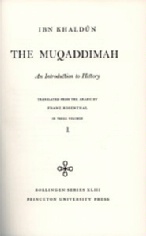al-Muqaddimah
THE MUQADDIMAH
The Muqaddimah, often translated as "Introduction" or "Prolegomenon," is the most important Islamic history of the premodern world. Written by the great fourteenth-century Arab scholar Ibn Khaldûn (d. 1406), this monumental work laid down the foundations of several fields of knowledge, including philosophy of history, sociology, ethnography, and economics. The first complete English translation, by the eminent Islamicist and interpreter of Arabic literature Franz Rosenthal, was published in three volumes in 1958 as part of the Bollingen Series and received immediate acclaim in America and abroad. A one-volume abridged version of Rosenthal's masterful translation was first published in 1969.
Princeton University Press
An Introduction to History
Translator's Introduction
Ibn Khaldnûn's Life
"WRITING the biography of Ibn Khaldûn would not seem to be a particularly difficult task, for he left posterity an autobiography which describes the events of the life in great detail and presents the historical background clearly. He supports his statements with many documents quoted literally. In fact, Ibn Khaldûn's description of his own life is the most detailed autobiography in medieval Muslim literature. It gives us an accurate knowledge of events in the author's life such as is available, before modern times, for but few historical personalities.
Until recently, Ibn Khaldûn's autobiography was known only in a recension that broke off at the end of the year 1394, but now its continuation has been dicovered and is available in a carefully annotated edition. It brings the account down to the middle of the year 1405, less than a year before Ibn Khaldûn's death ..." (op. cit., ibid., Vol. I, p. xxix)
"In 1382 the fifty-year-old scholar and statesman left his native northwest Africa never to return. For the period before this date, Ibn Khaldûn's autobiographical statements can be supplemented by a perfunctory biographical note incorporated by his friend Ibn-al-Khatîb in his History of Granada. Written in general terms of praise, it lacks any critical appreciation of its subject. There exists another biography of Ibn Khaldûn which a Western writer, Ismâ'îl b. Yûsuf b. al-Ahmar, inserted in an anthology of contemporary poets, entitled Nathîr al-jumân. The writer, a member of the ruling family of Granada, died about the same time as Ibn Khaldûn. It can be assumed that he relied on Western authorities for the earlier period of Ibn Khaldûn's life. Unfortunately, the text of this biography is not yet available.
For Ibn Khaldûn's later years, when he participated in the flourishing literary life of Mameluke Egypt, the biographical sources are more varied. Biographies of Ibn Khaldûn were composed by his pupils and admirers; nor could his enimies disregard him when writing the biographical history of the period. The latter present another view of his personality, and though their statements have to be taken with reservations, they help us to understand it better.
Ibn Khaldûn's own great work, especially the Muqaddimah, is another important source of his biography. Written in a much more personal style than most medieval works, the Muqaddimah sharply outlines his own personal philosophy and provides insights into the working of his mind ..." (op. cit., ibid., Vol. I, p. xxix-xxx)







